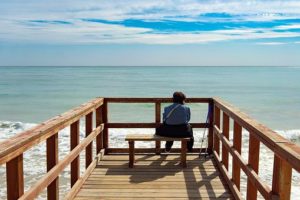POSTED IN: General Info
TAGS: Aging Alone, Aging Well, Depression, Isolation, Loneliness, Mental Health
Share this
Many older adults find themselves in this cycle of compounded loss, but it should never be considered the norm for this stage of life.Loneliness and social isolation are now believed to be as dangerous to our health as smoking 15 cigarettes a day, and surpass the mortality risks of obesity. A 2017 SCAN survey of 1,000 older adults uncovered this compelling statistic: 82 percent of those 65 and up know at least one person who is lonely, yet 58 percent would be reluctant to admit it if they themselves felt isolated. For many, it’s a vicious cycle of feeling lonely and depressed which perpetuates isolation and grief that extends beyond the usual time, said Dr. Romilla Batra, chief medical officer for SCAN Health Plan. According to experts, here’s what not to say to someone who is isolated and what to do instead: What Not to Say: “Oh, that was so long ago…” A person needs to be able to grieve without feeling guilty, MaryKay Kubota, whose husband died unexpectedly at 49, said. People can’t just “deal with it and move on.” What to Do Instead: Give the person adequate time — perhaps even a lifetime — to grieve. Recognizing that very real struggle — and the cyclical, non-linear aspect of it — is huge in terms of helping the individual, rather than pushing him or her further down isolation’s road. What Not to Say: “Let me know how I can help…” Unless you plan to deliver on your promise, this usually well-intended phrase only serves to push an already isolated individual further into isolation. “I would make up stories in my mind as to why they couldn’t help,” Kubota said. And in doing so, she began taking the blame for her loneliness. What to Do Instead: Jolyon Hallows, who lost his wife in his 50s, appreciated the friends who would bring dessert when he invited them over for dinner. “Fattening and thoughtful,” he said.
Isolation Scenarios: An older adult in your life is becoming increasingly isolated, and you worry that he or she is lonely, but you’re not sure what to do. It’s not the easiest subject to bring up, especially when family members or loved ones don’t want to admit they’re feeling alone. But lack of contact with others is a serious issue among older adults. Sometimes an older adult lacks a network of family and friends; other times he or she may withdraw into isolation as a result of health conditions, depression or mental illness. Physical limitations such as a fear of falling can keep an older adult isolated in her home, as can fatigue, chronic pain or shame over memory problems. Many older adults become nervous about driving long distances or can no longer drive after dark and may fear or resist using public transportation.
Facts of Loneliness: (1) New research is showing that loneliness may speed the onset of dementia. In a recent Dutch study published in the Journal of Neurology, Neurosurgery, and Psychiatry, researchers followed more than 2,000 healthy, dementia-free older adults for three years and found that 13 percent who reported feeling lonely developed dementia by the end of that time, as compared with 6 percent with strong social support. (2) There’s a link between loneliness and fatal heart disease. “I feel lonely” has a mortality rate 2.5 times higher than other patients 30 days post-surgery, and that even five years later patients were twice as likely to have died. (3) When researchers at the University of California, San Francisco, followed a group of older adults for six years, they found that by the end of the study period, almost a quarter (22.8 percent) of all those who had reported feeling isolated or lonely had died. And another 25 percent had suffered significant health declines. By comparison, among those who said they were happy or satisfied with their social lives, only 12.5 percent had declining health, and only 14.2 percent had died. Before you dismiss this type of isolation as common only among the very old, consider that the average age of the adults in the study was just 71. In other words, many baby boomers are reaching retirement age without strong social networks to support them. Another study, this time from Brigham Young University, analyzed study data for more than 300,000 people and found that loneliness was as strong a marker for early death as alcoholism and heavy (more than 15 cigarettes a day) smoking. From www.nextavenue.org.
Share this
Subscribe to our blog and monthly newsletter.











